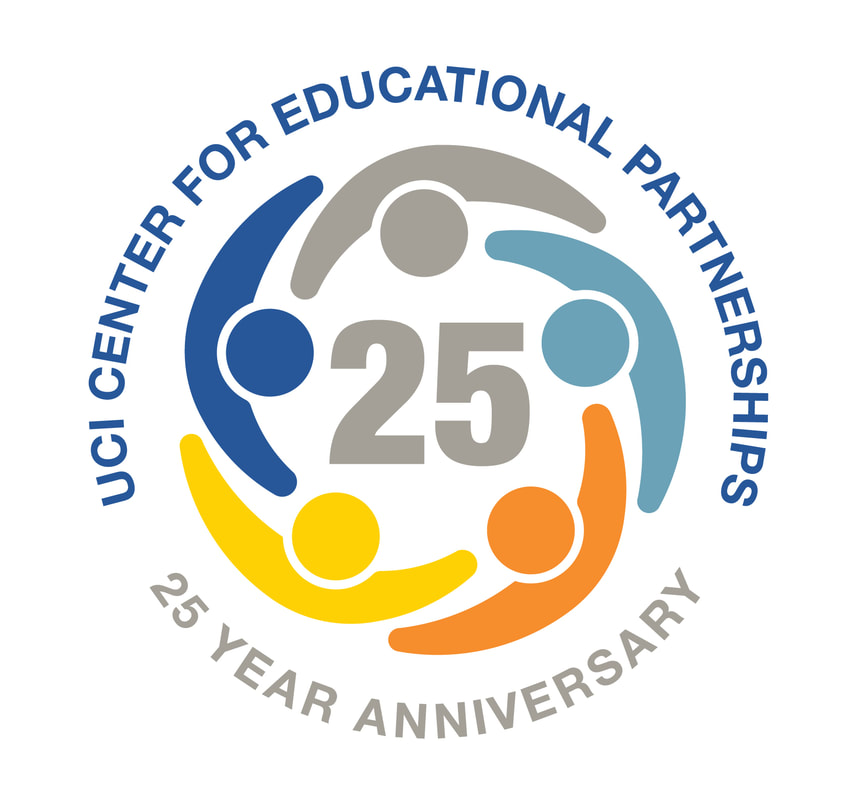A BRILLIANT FUTURE FOR
SOUTHERN CALIFORNIA EDUCATION
|
For the past 25 years, the UCI Center for Educational Partnerships has led hundreds of programs, grants and initiatives in the pursuit of educational equity.
CFEP was created in 1996 in response to California Proposition 209, which prohibited state governmental institutions from considering race, sex, or ethnicity in several areas, including college admissions. Since then, CFEP has adapted and evolved to confront novel challenges that threatened the pursuit of its mission. The Center has been a national bellwether in college preparation and support and in meeting the unique and diverse needs of the Southern California communities it serves. As CFEP enters its second quarter century, conditions that can prevent students from pursuing college and achieving their dreams will continue to materialize and endanger. So, what comes next? |
|
CFEP is continuing to learn, grow and innovate in partnership with faculty across the UCI campus, and with the schools and communities we serve. We look forward to a brilliant future with optimism and excitement for what is yet to come. Here is just a sampling of the many new projects currently underway.
Adriana Villavicencio, assistant professor at the UCI School of Education, is studying the creation of anti-racist schools through the professional development of school leaders and teachers. At the same time, she is measuring the impact of that work on the experiences and outcomes of students. Through CFEP, Villavicencio is bringing this work to local districts interested in creating classrooms that are culturally and linguistically relevant and schools that embody equity and racial justice.
“As a former leader of a research-practice partnership in New York City, I firmly believe in the value of an organization like CFEP for the local community and its long-term impact on the lives of our students,” Villavicencio said.
Adriana Villavicencio, assistant professor at the UCI School of Education, is studying the creation of anti-racist schools through the professional development of school leaders and teachers. At the same time, she is measuring the impact of that work on the experiences and outcomes of students. Through CFEP, Villavicencio is bringing this work to local districts interested in creating classrooms that are culturally and linguistically relevant and schools that embody equity and racial justice.
“As a former leader of a research-practice partnership in New York City, I firmly believe in the value of an organization like CFEP for the local community and its long-term impact on the lives of our students,” Villavicencio said.
|
In August, Dr. Pheather Harris, director of the UCI California Alliance for Minority Participation (CAMP), received a five-year, $3 million grant from the National Science Foundation that is designed to address systemic inequities that negatively influence the persistence and retention of African American, Black and Latinx students in STEM.
Postsecondary institutions in the U.S. do not graduate minoritized students in STEM at the same rates as non-minoritized students. Through the grant, Harris and other leaders at UCI will explore local and national data related to minoritized student STEM persistence and retention, work with faculty participants on exploring the social and cultural location of themselves and their students, and then modify faculty classroom practices and policies. “The goal is to ultimately change the culture of STEM so that all students can achieve and maximize their full potential,” Harris said. Jenny Woo is a doctoral candidate at the UCI School of Education and the creator of multiple award-winning social-emotional learning games that are used in homes and schools in more than 50 countries. |
In the summer, Woo piloted a culturally responsive emotional intelligence program with “at promise” students from CFEP’s Early Academic Outreach Program. She and her team are following students through high school and into postsecondary institutions to assess the impact. Moving forward, Woo plans to embed the program to help students from CFEP’s partner schools and academic preparation and residential programs transition to UCI successfully.
“Emotional intelligence can contribute to students’ sense of belonging, self-confidence and adaptive coping skills, and this is particularly impactful in helping first-generation and underrepresented students navigate imposter syndrome and a lack of connectedness on campus,” Woo said.
“Emotional intelligence can contribute to students’ sense of belonging, self-confidence and adaptive coping skills, and this is particularly impactful in helping first-generation and underrepresented students navigate imposter syndrome and a lack of connectedness on campus,” Woo said.
/
GEAR UP allows us to work with students, beginning in junior high, and follow them through high school and their first year of college. With this new award, CFEP is well positioned to continue its impact on the lives of the families and communities we serve for the next 25 years.
Santa Deputy Director, CFEP |
In October, the U.S. Department of Education awarded CFEP a seven-year, $5.2 million GEAR UP grant (Gaining Early Awareness and Readiness for Undergraduate Programs).
The grant will allow CFEP to invest in its partnerships with the Compton Unified School District, Compton College, and local community-based organizations to support the academic achievement of Compton students. It will fund collaborative work to improve academic outcomes for students, and increase college awareness and preparation among both students and their families to measurably raise students’ rate of high school graduation, college enrollment and college completion. “GEAR UP allows us to work with students, beginning in junior high, and follow them through high school and their first year of college,” said Santana Ruiz, deputy director, CFEP. “With this new award, CFEP is well positioned to continue its impact on the lives of the families and communities we serve for the next 25 years.” |
The preceding story is part of the "CFEP: 25 Years of Impact" series, honoring the people, programs and partnerships that have helped impact millions of students, teachers and families over the past quarter century. View the entire series here.




